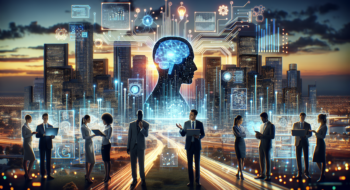In today’s rapidly advancing technological landscape, the question of whether artificial intelligence (AI) is beneficial for society has garnered significant attention. As AI in Society increasingly permeate our daily lives, from personal assistants to complex decision-making tools, it is crucial to evaluate their impact on various aspects of society. This exploration delves into the advantages and challenges posed by AI, examining its role in education, healthcare, and beyond. By understanding these dynamics, we can better navigate the future of AI and its influence on our world.
The Positive and Negative Impacts of AI on Society
The emergence of artificial intelligence (AI) is one of the most defining features of contemporary life, a double-edged sword that can both empower and disrupt. Think about it—a sophisticated AI can replicate human tasks, analyze massive datasets, and even beat us at games like chess and Go! Yet, what are the real implications of these technologies? What about the social norms we hold dear and the industries that might face upheaval? Let’s dissect the multi-faceted influences AI has on society, shall we?
The Bright Side of AI
First, let’s shine a light on the numerous benefits AI brings to the table. They’re not just cool gadgets for tech enthusiasts; AI systems truly have the potential to improve our lives in meaningful ways.
1. Revolutionizing Healthcare
One of AI’s most admired contributions can be found in the healthcare sector. Using machine learning algorithms, AI can sift through complex medical data to identify patterns that the human eye may miss. For instance, AI applications such as IBM Watson assist doctors in diagnosing diseases and crafting personalized treatment plans.
- Smart diagnostics can lead to early detection of conditions like cancer, greatly improving outcomes.
- Telemedicine boosted by AI provides remote consultations, making healthcare accessible to underserved populations.
- Robots powered by AI can assist in various surgical procedures, increasing precision and reducing recovery times.
2. Transforming Education
Imagine a world where every student can have a customized learning experience tailored to their individual needs. Yes, it’s happening! AI is transforming education by providing personalized learning plans for students. Adaptive learning platforms analyze students’ progress and tailor resources accordingly, enabling a more effective and engaging learning environment.
- AI tutors offer real-time feedback and help students grasp difficult concepts.
- Data insights help educators identify areas where students struggle, enhancing curriculum development.
- Automation of administrative tasks frees teachers to focus on what they do best—teaching!
3. Streamlining Industries
Across various industries—be it manufacturing, finance, or retail—AI systems automate mundane tasks, reduce operational costs, and improve efficiency. For instance, consider how supply chain management benefits from AI:
- Predictive analytics forecast demand, optimizing inventory management.
- AI-powered chatbots provide customer service without the need for human intervention.
- Robotics assembly lines reduce human error and produce goods at an unprecedented pace.
Want to learn more about the future of work influenced by AI? Check out this link to Neyrotex.com for in-depth insights.
The Dark Side of AI
<pHowever, as our society adapts to the rise of AI, concerns about its darker implications loom large. These concerns prove that even technology with the best intentions can yield unintended consequences.
1. Job Displacement
Perhaps the most pervasive worry surrounding AI is the threat it poses to jobs. As AI technology evolves, many tasks previously performed by humans are now efficiently executed by machines. The concern that machines might replace workers is not unfounded.
- Manufacturing jobs are dwindling as robots take over assembly lines.
- Data entry and routine bookkeeping are gradually being automated.
- Even roles like customer service representatives are being replaced by AI chatbots.
It’s essential to frame this discussion around the idea of “reskilling”—retraining the workforce to fill new roles that AI creates. But the wrench in the wheel? The transition might worsen inequality as those unable to adapt could find themselves left behind.
2. Privacy Concerns
Privacy is another pressing issue in the realm of AI. With data being the lifeblood of AI systems, there comes a cost: the erosion of individual privacy. Companies harvest vast amounts of personal data to fuel their AI systems, often without full transparency.
- Surveillance technologies, like facial recognition, raise ethical debates about consent and civil liberties.
- Targeted advertisements invade personal browsing behavior, leading to questions about data ethics.
- Cybersecurity risks grow as hackers target AI tools, compromising sensitive information.
To read more on data privacy in the age of AI, you may find this link to a resource informative.
3. Ethical Dilemmas
As AI begins to make decisions typically reserved for humans, ethical dilemmas emerge. The guidelines surrounding actions taken by autonomous systems, especially in life-or-death scenarios (self-driving cars, for instance), fall under scrutiny.
- Should AI prioritize the lives of its passengers over pedestrians? The ethical implications are staggering.
- Are AI-driven decisions biased because they reflect historical data that may be prejudiced?
- How do we hold machines accountable for their actions?
These questions remind us that alongside our technological triumphs, we must tread carefully, ensuring our innovations uphold our societal values. Curious to explore ethical guidelines in technology? Dive deeper with this resource link.
The Path Forward
So where do we go from here? As AI continues to evolve, society must harness its tremendous potential while safeguarding against its risks. Collaboration between technologists, policymakers, and ethical scholars will be key in charting a course that benefits all. It starts with informed citizens demanding responsible practices and oversight regarding AI implementations.
1. The Role of Regulations
There is a need for robust regulations that keep pace with the rapid advancements in AI. Governments around the world are beginning to recognize this necessity. Fair and equitable guidelines can help us navigate the murky waters of AI technology:
- Establish a framework for responsible AI that promotes transparency.
- Implement data protection laws to secure personal information from misuse.
- Allocate resources for programs that support workforce retraining.
2. Public Awareness and Education
Also significant is the creation of greater public awareness regarding AI technologies. As individuals, we can empower ourselves by learning how these technologies work and their implications. Educating ourselves about AI will foster critical discussions about its benefits and pitfalls.
Online platforms, community programs, and academic institutions should incorporate AI into their curriculums, providing essential knowledge from a young age. Who wouldn’t want to be an informed citizen in a tech-dominated world?
As we can see, the duality of AI signals an urgent call for balanced approaches in society. Technology is here, so we better become wise custodians of it. Dive more into this discourse by visiting Neyrotex.com for valuable resources.
Conclusion
In conclusion, artificial intelligence is a formidable force shaping our society, wielding the power to uplift and disrupt. As we navigate this technological frontier, it is critical to embrace its benefits while remaining vigilant against its challenges. Striking the right balance will empower not just individuals, but entire communities, allowing us to ride the AI wave positively into the future.
Let’s advocate for a future where AI works *for* us, unlocking doors to new opportunities while keeping our values firmly in sight. After all, the relationship between AI and society isn’t merely a matter of good or bad—it’s an intricate dance that we must navigate together.







